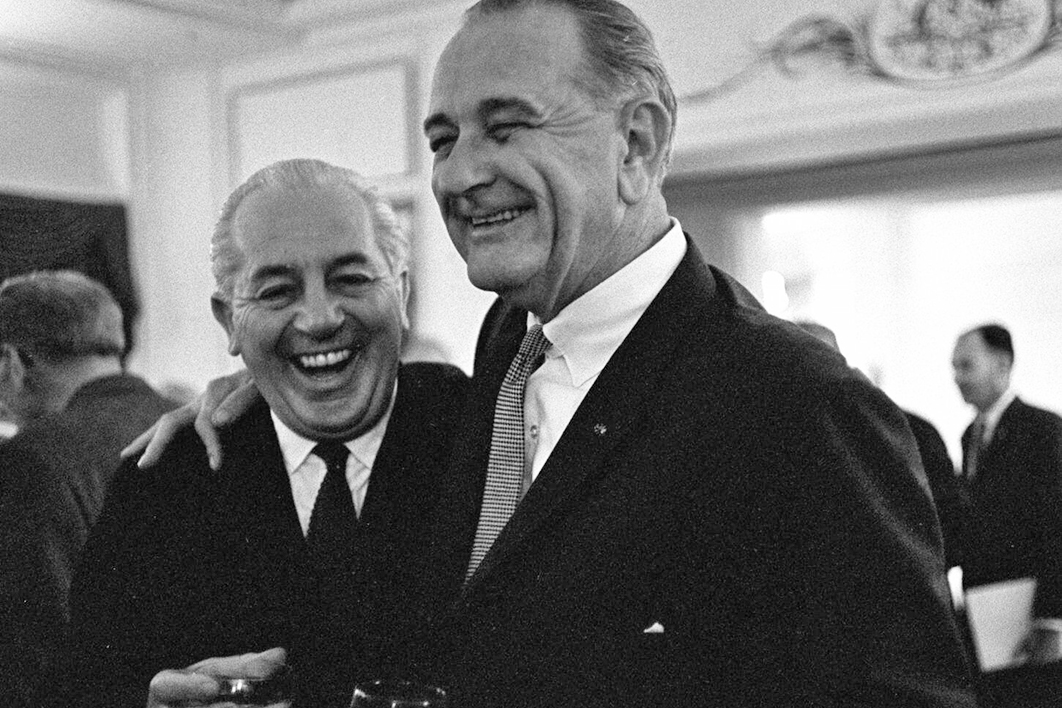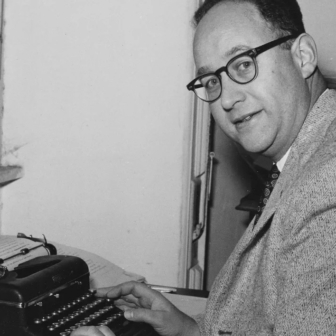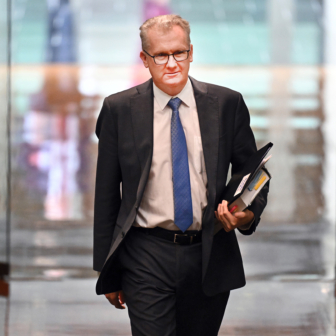Has the end ever so defined the whole? In the fifty-five years since he disappeared into the surf at Cheviot Beach, Harold Holt’s life has been so defined by the circumstances of his death that his first biographer, Tom Frame, felt it necessary to give both equal weight in his title, The Life and Death of Harold Holt. Yet the explanation for Holt’s end has always been so unsatisfyingly banal that many have reached for the extraordinary and risible: stories of Chinese submarines, CIA assassins, exile in the south of France and suicide.
That said, a question has always needed to be asked about Holt’s death. Why did he go into the surf? The water was crashing into the rocks; the ocean was heaving; the tide was inexorably strong. To enter the waters was profoundly dangerous. Holt’s colleagues were mystified. “I will never quite understand,” his predecessor as prime minister, Bob Menzies, declared. Friends were similarly perplexed. “God only knows why,” said one.
The question gives any biographer of Holt a key task: to play God and explain why a man occupying his country’s foremost political office, who knew well the dangers of the waters before him and could feel in every movement of his sore right shoulder the limitations of his body, decided to walk into the surf in his sandshoes and bathers to be carried away like a leaf.
In Harold Holt: Always One Step Further, his latest biographer, Ross Walker, makes no pretence of omniscience. “When we try to understand the motives underpinning a person’s behaviour,” he writes, “we are always operating in the orbit of surmise.” With this caveat made, Walker offers an intimate, eloquent and persuasive account of Holt’s behaviour and character from his youth to his sudden death. He restores much life to this short-reigning prime minister and movingly tracks Holt’s steps down to Cheviot Beach, to the sands where his footprints cease, to the waters in which he disappeared.
As a biographical subject, Holt is an unpromising figure. He left few personal papers and confided in fewer still of his contemporaries. Beyond those that appear in the public record, his opinions, beliefs and feelings vanished with him. Information about his early life has for many years been especially limited.
Writing nearly two decades ago, Frame found the surviving material so meagre that he felt he could only draw a “broad outline” of Holt’s youth, and so dispensed with pre-parliamentary life in fewer than twelve pages. Walker adds depth and detail to this outline with a combination of new material and an expansive and empathetic reading of the facts at hand.
Born in 1908, Holt became accustomed early to insecurity. His father, a handsome wastrel, moved through successive careers as a teacher, hotelier and theatre manager, divorcing Holt’s mother in 1918 and later — to his son’s horror — marrying a woman Holt himself had been seeing.
Young Harold was shuttled between relatives and schools, always on the move, until he landed at Melbourne’s Wesley College, which he attended from 1920 to 1926. This constant flux, Walker argues, was the spur for the charm that Holt wielded so successfully in his political career: “When you had to keep re-establishing yourself in a succession of different environments, it was an asset to be able to please others.”
Holt’s amiability was a shield against the blows that marked his time at Wesley. At sixteen, he grieved his mother’s death in the dormitory. In spite of his better claim to the top position, he accepted the deputy school captain’s position with grace. Made acting captain at the last minute, a gratified Holt had to stand before his peers and sing of their imminent departure from a school that had provided the first real sense of security in his life: “Although the time has come for us to part, you’ve still your corner in my heart.” But knowing that no-one was in that audience for him gave Holt a profound feeling of loneliness which he never forgot.
But soon, as a law student at Melbourne University, he found the woman who alleviated it. Zara Dickins, confident, wilful and artistically minded, came from a stable family background and desired to stand on her own two feet. The pair were a good match. But their relationship was interrupted by the nonchalance born of Holt’s need for self-protection (“You’ll do me for a few weeks,” he told her), by his romance with the woman his father would soon marry, and by Zara’s marriage to an English cavalry officer with whom she would have three children. By the time their relationship resumed, this time for good, Holt was in parliament and the world was on the cusp of war.
Walker sketches this period using scenes, dialogue, evocative descriptions and thematic markers that help readers see Holt and his surrounds. The result is compelling, but at times skips too lightly around what should be explained. At university, for example, Holt was already intent on “making a difference” in politics. Why he wanted to, and what difference he might make, is neither raised nor answered. Holt might well have joined the United Australia Party (UAP) because of what he saw as its “easy tolerance of all political beliefs,” but the expressions of his political beliefs cited here would have seen him welcomed into any party. “There are so many things that should be done in this country,” he said on one occasion. “It’s a wonderful country, and we’ve got to open it up, expand it.”
Evidence of the lack of hard facts and detail recurs. After earning honourable scars for the UAP at the 1934 federal election and the 1935 Victorian election, Holt was elected to the federal parliament, aged twenty-seven, in 1935. He was briefly a minister in 1939, then again in 1940 after a plane crash killed three ministers in the precariously balanced Menzies government of 1939–41. As labour and national service minister, he negotiated with unions and employers, introduced the Child Endowment Act, and eventually argued for Menzies to yield the prime ministership to Arthur Fadden. All are noted. But how Holt negotiated, why he championed the act and what he felt were Menzies’s deficiencies as leader are missing.
Walker presents us instead with more intimate scenes. Holt’s famed affinity with the water came relatively late, after the children he raised with Zara introduced him to spearfishing and accompanied him on early-morning dives. The water gave this urbane city solicitor turned politician a new sense of solitude and space; without it, he said, “I would go bonkers.”
The desire for regular retreats to the ocean was impetus for the house he and Zara built at Portsea and another they bought at Bingil Bay in Queensland; it was also his way of dealing with uncertainty. The risk in skindiving, Holt remarked, was “part of the attraction,” something to be enjoyed. As Walker argues, in a sentence pregnant with meaning, “Experience had taught him that life was inherently insecure, so why not enjoy risk rather than fear it?”
Risk attended Holt in the years that followed. Resuming the labour and national service portfolio in 1949, he won plaudits for his adroit handling of industry, and in 1956 became deputy leader of the Liberal Party and thereby heir apparent to Menzies. But his ascent was never as assured as some have claimed: he only narrowly beat Senator Bill Spooner in the ballot for deputy and, as treasurer from 1958 to 1966, his prospects were greatly damaged by a credit squeeze that nearly cost the Coalition government at the 1961 election. By 1966, however, when Menzies retired, Holt’s position was supreme. He became prime minister “without stepping over any dead bodies.”
As prime minister, though, Holt saw many. Three months after he took office, an Australian conscript, Errol Noack, died in Vietnam; Australia’s military involvement escalated precipitously. The man who had been acclaimed as the “godfather of a million children” after introducing the child endowment scheme in 1940 was now responsible for sending more than 7000 of them to a conflict in which 521 would die. The 1966 election was largely defined by the Vietnam war, but with popular opposition still nascent and an aged Arthur Calwell leading Labor for the final time, Holt and his government romped home with a record majority.
Holt had become prime minister amid some questions about his ability. Had he been deputy too long? Would he be able to lead? The successes of 1966 might have quieted those questions, but the mounting problems in 1967 saw them raised again.
Over the course of that year Holt contended with a treasurer and deputy prime minister at war with one another; with a backbench agitating for a new inquiry into the collision between two naval warships, the Voyager and the Melbourne; with demands for transparency after government VIP flights were shown to have been misused; with a new Labor leader, Gough Whitlam, signalling generational change in the opposition; with a rising death toll and other difficulties in Vietnam; and with two by-elections and a half-Senate election at which increasing discontent with Holt’s performance was registered, quantified and used by his enemies.
There is little to suggest that Holt would regain the initiative and much to suggest that he was flagging, both physically and mentally. By the end of 1967 he was taking morphine tablets for a stiff and painful shoulder, and sometimes lost all feeling in the fingers of his right hand. He was exasperated by some of his colleagues and by the government’s difficulties. “Man wasn’t meant to live like this,” he complained to one public servant; to another, he observed, “Nobody can live forever.”
Walker builds this picture, attentive to the resonant and the telling. He spots in Holt’s infamous “All the way with LBJ” speech a phrase from the Wesley College leaving song. The loneliness Holt had experienced in 1926 was the same loneliness he imagined, as prime minister, all national leaders feeling. Hence his remarks to president Lyndon Johnson — LBJ — on the White House lawns:
And so, sir, in the lonelier and more disheartening moments which come to any national leader, I hope there will be a corner in your heart which takes cheer from the fact that you have an admiring friend, a staunch friend, that will be all the way with LBJ.
Walker also relates Holt’s conversation with Reg “Spot” Turnbull, the fellow Wesleyan who was appointed school captain to Holt’s deputy in 1926, but was now, forty years later, an independent senator and spiky critic of the government’s involvement in Vietnam. “You were captain of the school. I was only acting captain,” Holt complained. “But you’re the prime minister, Harold,” a surely bewildered Turnbull replied. “And I’m not.”
Walker accompanies illuminating moments with sharp phrases and pointed similes. Holt’s position as Menzies’s heir apparent is that of “an incoming batsman waiting for a teammate to declare his long innings closed.” Newly prime minister in 1966, smiling in a wetsuit and surrounded by his bikini-clad daughters-in-law, Holt has the look of a “genial seal” and, after winning re-election at a canter, that of a man “who has survived some unpleasant surgery.”
But war in Vietnam — “shaped like a snake, slithering southwards” — leaves political wounds and takes a physical toll. Lyndon Johnson’s face becomes a “ploughed field, the furrows deepening year by year with the daily harvest of worry, arm-twisting, and conflict.” And Holt’s temple of a body — fit enough to be a jet pilot, he thought at one point — is by 1967 a museum of “accumulated scars, scratches, and infirmities.”
What emerges most strongly in Walker’s book is just how many times Holt had been able to avoid more scars. When laid out, his life seems a succession of near misses, lucky breaks and last-minute aversions from disaster. He was almost struck by a passing car in 1941; he was in a car accident that killed his driver in 1955; as prime minister, he found a bullet hole in his window at Parliament House and would have drowned in May 1967 but for a friend who saw him entangled in kelp and gurgling salt water.
Politically, he had a close shave in the 1961 credit squeeze and was rescued from political disaster during the VIP affair by the cool thinking of John Gorton, his eventual successor. In his personal life, he had a second chance with Zara that allowed some absolution for his earlier disregard, yet he also had affairs, most notably with his Portsea neighbour Marjorie Gillespie.
Never was a man more aptly nicknamed — in his case as “Cat” — by his schoolfriends. Invoking these incidents and many more, Walker spies below Holt’s modesty and charm a recklessness engendered by the tragedies of his youth and sustained, as an adult, by their failure to recur. “Holt had often been in the presence of death,” he writes, “and had always survived.”
Holt’s family and close friends were aware of this effect. In her memoirs, Zara recalled once warning her husband of crocodiles in a river; she was brushed off. When she pointed to a nearby shark on another occasion, Holt dismissed her with a brusque, “You’re disturbing the fish.” One friend felt compelled to be blunt: “Listen, cock, stop being so bloody brave. Must you insist on making yourself natural assassin bait?” Holt’s own brother, dying of cancer, also told him to be more careful: “Your health becomes of vital importance to yourself and the party, so do us all a good favour by watching it.” And yet Holt would not watch it, would not stop himself from going one step further.
In this light, the questions about Holt’s decision to go into the surf in December 1967 seem profoundly misplaced. “Surely you’re not going in,” Marjorie Gillespie said when Holt appeared on Cheviot Beach in his sandshoes and bathers. But Holt, as the reader now fully understands, was never going to eschew a swim because it was dangerous. He went in precisely because it was. And so, Walker writes, the prime minister answered Gillespie “by striding towards the water.”
Harold Holt: Always One Step Further
By Ross Walker | La Trobe University Press in conjunction with Black Inc. | $34.99 | 328 pages




